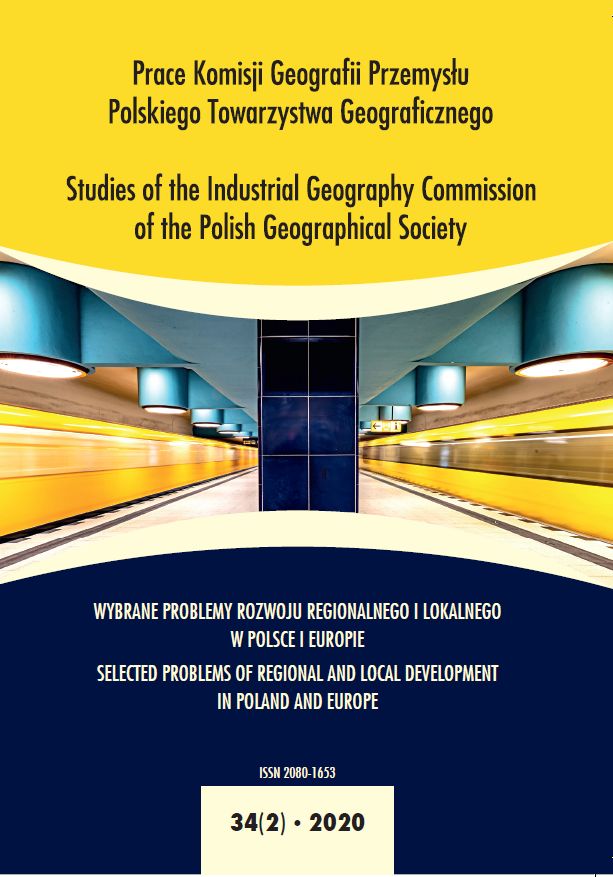Role of Deposit Return Systems in the Organisation of Municipal Waste Recycling in European Countries. The use of RVMs
DOI:
https://doi.org/10.24917/20801653.342.4Keywords:
deposit, deposit reverse system, municipal waste, packaging waste, PET, recycling, reverse vending machines, RVMAbstract
Deposit Refund/Return Systems (DRS) are currently operating successfully in several European countries, similar organisational solutions are found in the United States, Australia and other countries. Such systems use a mechanism of collecting a deposit for the purchase of certain goods and returning the deposit if the customer gives the packaging back to the seller or a special collection point. Such systems also increase the circulation of materials and raw materials in recycling processes and thus reduce the level of waste disposal. RVM machines (Reverse Vending Machines), popularly known in Poland as “bottling machines”, are a popular element improving the operation of such organisational systems. Deposit and return systems are a common name for the way of organising and increasing the degree of recycling of waste, especially packaging waste from households. However, they differ in terms of organisational and regulatory solutions in individual countries. Therefore, the purpose of this article is to compare the solutions applied in the European countries in the area of returnable deposit systems, to make their typology, to present the benefits and achievements of individual countries and the difficulties in implementing such a way of dealing with waste. The article uses reports and statistical data, as well as the results of research conducted by consulting companies and checking operators of return depository systems.
Downloads
Metrics
References
Deloitte (2017). Pozyskano z https://sdr.gdos.gov.pl/Documents/GO/Ekspertyzy/
Badcock, B. (2002). Making Sense of Cities. A Geographical Survey. London. Arnold.
Balcers, O., Brizga, J., Moora, H., Raal, R. (2019). Deposit Return Systems for Beverage Containers in The Baltic States. Riga: Green Liberty.
Beatley, T. (red.) (2012). Green Cities of Europe. Global Lessons on Green. Washington: Island Press.
Chakrabarti, T. (2014). Emergence of Green Technologies Towards Sustainable Growth. W: M.H. Fulekar, B. Pathak, R.K. Kale (red.). Environment and Sustainable Development. New Delhi, Heidelberg, New York, Dordrecht, London: Springer. doi: 10.1007/978-81-322-1166-2
CM Consulting Inc. Deposit Systems For One‑Way Beverage Containers: Global Overview. (2016). Pozyskano z https://www.cmconsultinginc.com
Cordle, M., Elliott, L., Elliott, T., Kemp, S., Sherrington, Ch., Woods, O. (2019). A Deposit Refund System for the Czech Republic. Final Report. Eunomia Research & Consulting Ltd. Pozyskano z https://www.eunomia.co.uk/reports‑tools/deposit-refund-system-czech-republic/
Davies, P. (2017). Report for the Auckland Council. Cost‑benefit analysis of a Container Deposit Scheme. Sapere Research Group.
Declaration of the Circular Plastics Alliance (2019, 1 grudnia). Komisja Europejska. Pozyskano z https://ec.europa.eu/docsroom/documents/36361
Dyrektywa Parlamentu Europejskiego i Rady (UE) 2018/849 z dnia 30 maja 2018 roku zmieniająca dyrektywy 2000/53/WE w sprawie pojazdów wycofanych z eksploatacji, 2006/66/WE w sprawie baterii i akumulatorów oraz zużytych baterii i akumulatorów i 2012/19/UE w sprawie zużytego sprzętu elektrycznego i elektronicznego.
Dyrektywa Parlamentu Europejskiego i Rady (UE) 2018/850 z dnia 30 maja 2018 roku zmieniająca dyrektywę 1999/31/WE w sprawie składowania odpadów.
Dyrektywa Parlamentu Europejskiego i Rady (UE) 2018/851 z dnia 30 maja 2018 roku zmieniająca dyrektywę 2008/98/WE w sprawie odpadów.
Dyrektywa Parlamentu Europejskiego i Rady (UE) 2018/852 z dnia 30 maja 2018 roku zmieniająca dyrektywę 94/62/WE w sprawie opakowań i odpadów opakowaniowych.
Dyrektywa Parlamentu Europejskiego i Rady (UE) 2019/904 z dnia 5 czerwca 2019 roku w sprawie zmniejszenia wpływu niektórych produktów z tworzyw sztucznych na środowisko.
Fletcher, D., Hogg, D., Eye, M., Elliott, T., Bendali, L. (2012). Examining the Cost of Introducing a Deposit Refund System in Spain. Eunomia Research & Consulting Ltd. Pozyskano z https://www.eunomia.co.uk/reports-tools/examining-the-cost-of-introducing-a-deposit-refund-system-in-spain/
Forbes (2019, 1 grudnia). Zostanie wprowadzona kaucja za plastikowe butelki. Pozyskano z https://www.forbes.pl/gospodarka/oplata-za-wprowadzanie-na-rynek-opakowan/bsl99tk
Hanaki, K. (2002). Environmental loading of resource and heat recovery. W: F. Moavenzadeh, K. Hanaki, P. Baccini (red.). Future Cities: Dynamics and sustainability. Springer-Science + Business Media, B.V. ISBN 978-94-010-0365-0 (e-book).
Hołuj, A. (2018). Ekonomiczne i ekologiczne efekty zewnętrzne w planowaniu przestrzennym. Łódź: Wydawnictwo Uniwersytetu Łódzkiego.
Moir, E., Moonen, T., Clark, G. (2014). What Are Future Cities? Origins, Meanings And Uses. Government Office for Science. Pozyskano z https://www.gov.uk/government/publications/future‑cities-origins-meanings-and-uses
Report From The Commission To The European Parliament, The Council, The European Economic And Social Committee And The Committee Of The Regions on the implementation of the Circular Economy Action Plan (2019). Pozyskano z https://ec.europa.eu/commission/sites/beta-political/files/report_implementation_circular_economy_action_plan.pdf
Rogers, R. (1997). Cities for a Small Planet. London: Faber & Faber.
Rudewicz, J. (2019). Metabolizm i energia w mieście. Przegląd Uniwersytecki. Pismo Uniwersytetu Szczecińskiego, 4–6, 21–24.
System kaucyjny. Fakty i mity (2019, 1 grudnia) Deloitte. Pozyskano z https://www2.deloitte.com/pl/pl/pages/press-releases/articles/butelki-plastikowe-system-kaucyjny.html
The History of Reverse Vending 1920 to 2014 (2013) (2019, 1 grudnia). Reverse Vending News. Pozyskano z https://reversevending.wordpress.com/2013/09/16/the-history-of-reversevending-1920-to-2013/
The New Plastics Economy. Rethinking the future of plastics NPE (2016) (2019, 1 lipca). Pozyskano z http://www3.weforum.org/docs/WEF_The_New_Plastics_Economy.pdf
Ustawa o odpadach z dnia 14 grudnia 2012 roku (Dz.U. z 2019 r. poz. 701).
Walczak, R. (2014). Podstawy zarządzania projektami – metody i przykłady. Warszawa: Difin.
Ween, C. (2012) A Global and Sustainable Capital City. W: T. Beatley (red.). Green Cities of Europe. Global Lessons on Green Urbanism. Washington, Covelo, London: Islandpress.
Downloads
Published
How to Cite
Issue
Section
License
Articles are published under the terms of the Creative Commons License (CC BY-ND 4.0; Attribution– NoDerivs).

